John Deere BG20658 User manual
- Category
- Lawnmowers
- Type
- User manual
This manual is also suitable for

OMGX23532 J0
JOHN DEERE
WORLDWIDE COMMERCIAL & CONSUMER
EQUIPMENT DIVISION
GX23532
J0
John Deere Tractors
100 Series
OPERATOR’S MANUAL
North American Version
Litho in U.S.A.

Original Instruction
All information, illustrations and
specifications in this manual are based on
the latest information at the time of
publication. The right is reserved to make
changes at any time without notice.
COPYRIGHT© 2010
Deere & Co.
John Deere Worldwide Commercial and
Consumer Equipment Division
All rights reserved
Previous Editions
COPYRIGHT© 2009
c WARNING: The Engine Exhaust
from this product contains chemicals known
to the State of California to cause cancer,
birth defects or other reproductive harm.
California Proposition 65 Warning
Introduction - 1
INTRODUCTION
Introduction
Thank You for Purchasing a John Deere Product
We appreciate having you as a customer and wish you many years of safe
and satisfied use of your machine.
Using Your Operator’s Manual
This manual is an important part of your machine and should remain with
the machine when you sell it.
Reading your operator’s manual will help you and others avoid personal
injury or damage to the machine. Information given in this manual will
provide the operator with the safest and most effective use of the machine.
Knowing how to operate this machine safely and correctly will allow you to
train others who may operate this machine.
This manual and safety signs on your machine may also be available in
other languages (see your authorized dealer to order).
Sections in your operator’s manual are placed in a specific order to help
you understand all the safety messages and learn the controls so you can
operate this machine safely. You can also use this manual to answer any
specific operating or servicing questions.
The machine shown in this manual may differ slightly from your machine,
but will be similar enough to help you understand our instructions.
RIGHT-HAND and LEFT-HAND sides are determined by facing in the
direction the machine will travel when going forward. When you see a
broken line (------), the item referred to is hidden from view.
Before delivering this machine, your dealer performed a predelivery
inspection to ensure best performance.
Special Messages
Your manual contains special messages to bring attention to potential
safety concerns, machine damage as well as helpful operating and
servicing information. Please read all the information carefully to avoid
injury and machine damage.
NOTE: General information is given throughout the manual that may
help the operator in the operation or service of the machine.
Product Identification
Record Identification Numbers
Lawn Tractors
D100, D110, D120, D130, D140, D150, D160, D170
PIN (100001-)
If you need to contact an Authorized Service Center for information on
servicing, always provide the product model and identification numbers.
You will need to locate the product identification number (PIN) for the
machine and engine serial number. Record the information in the spaces
provided below.
DATE OF PURCHASE:
c CAUTION: Avoid injury! This symbol and text highlight
potential hazards or death to the operator or bystanders that may
occur if the hazards or procedures are ignored.
IMPORTANT: Avoid damage! This text is used to tell the operator
of actions or conditions that might result in damage to the
machine.
Table of Contents
Introduction................................................................................................ 1
Product Identification................................................................................. 1
Safety Labels............................................................................................. 3
Safety ........................................................................................................ 5
Assembly................................................................................................... 9
Operating Controls .................................................................................. 11
Operating................................................................................................. 14
Service Intervals...................................................................................... 25
Service Lubrication.................................................................................. 25
Service Engine ........................................................................................ 26
Service Transmission ............................................................................. 32
Service Mower......................................................................................... 32
Service Electrical..................................................................................... 37
Service Miscellaneous ............................................................................ 39
Troubleshooting ....................................................................................... 42
Storage.................................................................................................... 44
Specifications .......................................................................................... 45
Warranty .................................................................................................. 48
Index........................................................................................................ 50
Getting Quality Service ........................................................................... 51
Service Record........................................................................................ 53

Product Identification - 2
PRODUCT IDENTIFICATION
_________________________________________
DEALER NAME:
_________________________________________
DEALER PHONE:
_________________________________________
PRODUCT IDENTIFICATION NUMBER:
__ __ __ __ __ __ __ __ __ __ __ __ __ __ __ __ __
ENGINE SERIAL NUMBER:
__ __ __ __ __ __ __ __ __ __ __ __ __ __ __ __ __
Machine Product Identification Number Location
MX46486
Picture Note: Located on left side of frame.
Engine Serial Number Location
MX25599
Picture Note: Single Cylinder Engines
MX46487
Picture Note: V-Twin Engines
Register Your Product and Warranty Online
To register your product through the Internet, simply go to
www.JohnDeereWarrantyRegistration.com. Completing the information,
either online or with the product warranty card, will ensure the customer
that their product receives all post sales service and important product
information.

Safety Labels - 3
SAFETY LABELS
Safety Labels
Safety Label Location
MX46490
Picture Note: Use label number listed in table below to locate
complete text of safety label message following this illustration.
A- WARNING GX22477
B- DANGER/CAUTION M128699
C- WARNING MX4878
D- DANGER M118610
E- WARNING GX22622
F - DANGER GX22477
G- DANGER M89504
H- WARNING M159705
B
H
A
C
D
G
F
E

Safety Labels - 4
SAFETY LABELS
Understanding The Machine Safety Labels
The machine safety labels shown in this section are placed
in important areas on your machine to draw attention to
potential safety hazards.
On your machine safety labels, the words DANGER,
WARNING, and CAUTION are used with this safety-alert symbol.
DANGER identifies the most serious hazards.
The operator’s manual also explains any potential safety hazards
whenever necessary in special safety messages that are identified with
the word, CAUTION, and the safety-alert symbol.
There can be additional safety information contained on parts and
components sourced from suppliers that is not reproduced in this
operator’s manual.
Warning
MX4878
Picture Note: This label appears on Briggs and Stratton engines
only.
• Read and follow Operating Instructions before running engine.
• Gasoline is flammable. Allow engine to cool at least 2 minutes before
refueling.
• Engines emit carbon monoxide, DO NOT run in enclosed area.
DANGER
M118610
ROTATING BLADE
• Do not put hands or feet under or into mower when engine is running.
DANGER - M89504
M89504
ROTATING BLADE
• Do not put hands or feet under or into mower when engine is running.
THROWN OBJECTS
• Before mowing, clear area of objects that may be thrown by blade.
• Do not operate mower without discharge chute or entire grass catcher in
place.
WARNING
GX22477
AVOID SERIOUS INJURY OR DEATH
• Drive up and down slopes, not across.
• Avoid sudden turns.
• If machine stops going uphill, stop blades and back down slowly.
• Keep safety devices (guards, shields, and switches) in place and
working.
• Remove objects that could be thrown by blades.
• Read operator’s manual.
• Remove objects that can be thrown by blades
• When leaving machine:
–Stop engine
–Set park brake
–Remove key
DANGER
GX22477
ROTATING BLADES CUT OFF ARMS AND LEGS
• Do not mow when children or others are around.
• Do not mow in reverse.
• Look down and behind before and while backing.
• Never carry children even with blades off.
DANGER M128699
M128699
Picture Note: Located on battery

Safety - 5
SAFETY
• Shield eyes, explosive gases can cause blindness or injury.
• No sparks, flames, smoking.
• Sulfuric acid can cause blindness or severe burns.
• Flush eyes immediately with water. Get medical help fast.
• Keep out of reach of children.
• Do not tip.
• Keep vent caps tight and level.
Warning M159705
M159705
Picture Note: This label is required and installed on machines sold
in California. This label may also be installed on machines sold in
other locations.
Operation of This Equipment May Create Sparks that Can Start Fires
Around Dry Vegetation. A Spark Arrestor May be Required. The Operator
Should Contact Local Fire Agencies For Laws or Regulations Relating to
Fire Prevention Requirements.
Emission Control System Certification Label
NOTE: Tampering with emission controls and components by
unauthorized personnel may result in severe fines or penalties.
Emission controls and components can only be adjusted by EPA
and/or CARB authorized service centers. Contact your John Deere
Commercial and Consumer Equipment Retailer concerning emission
controls and component questions.
The presence of an emissions label signifies that the engine has been
certified with the United States Environmental Protection Agency (EPA)
and/or California Air Resources Board (CARB).
The emissions warranty applies only to those engines marketed by John
Deere that have been certified by the EPA and/or CARB; and used in the
United States and Canada in off-road mobile equipment.
Emission Compliance Period
If your engine has the emission compliance category listed on the
emission control system certification or air index label, this indicates the
number of operating hours for which the engine has been certified to meet
EPA and/or CARB emission requirements. The following table provides
the engine compliance period in hours associated with the category found
on the certification label.
Certification
Your mower has been certified for compliance with American National
Standards Institute B-71.1-2003, “Safety Specifications” for Power Lawn
Mowers, Lawn and Garden Tractors, and Lawn Tractors.
Canadian Electromagnetic Compatibility (EMC)
Compliance
This spark ignition system complies with Canadian ICES-002.
Safety
Operating Safely
This cutting machine is capable of amputating hands and
feet and throwing objects. Failure to observe the following
safety instructions could result in serious injury or death.
• Read, understand and follow all instructions on the
machine and in manuals provided, and view safety video, before starting.
Be thoroughly familiar with the controls and the proper use of the machine
before starting.
• Do not put hands or feet near rotating parts or under the machine. Keep
clear of the discharge opening at all times.
• Only allow responsible adults, who are familiar with the instructions, to
operate this machine. Local regulations may restrict the age of the
operator.
• Clear the area of objects such as rocks, wire and toys which could be
thrown by the blades.
• Be sure the area is clear of bystanders before operating. Stop machine if
anyone enters the area.
• Never carry passengers.
• Do not mow in reverse unless absolutely necessary. Always look down
and behind before and while backing.
• Never direct discharged material toward anyone. Avoid discharging
material against a wall or obstruction. Material may ricochet back toward
the operator. Stop the blades when crossing gravel surfaces.
• Do not operate the machine without the entire grasscatcher, discharge
guard, or other safety devices in place and working. Never operate with
the discharge deflector raised, removed, or altered, unless using a
grasscatcher.
• Slow down before turning.
• Never leave a running machine unattended. Always turn off blades, lock
park brake, stop engine and remove key before dismounting.
• Disengage blades when not mowing. Shut off engine and wait for all
parts to come to a complete stop before cleaning the machine, removing
the grasscatcher, or unclogging the discharge chute.
• Operate machine only in daylight or good artificial light.
• Do not operate the machine while under the influence of alcohol or
drugs.
• Watch for traffic when operating near or crossing roadways. Stop blades
before crossing roads or sidewalks.
Agency Category Hours
EPA C 250
EPA B 500
EPA A 1000
CARB Moderate 125
CARB Intermediate 250
CARB Extended 500
Agency Category Hours

Safety - 6
SAFETY
• Use extra care when loading or unloading the machine into a trailer or
truck.
• Always wear safety goggles or safety glasses with side shields when
operating machine.
• Data indicates operators 60 years and above are involved in a large
percentage of riding mower-related injuries. These operators should
evaluate their ability to operate the riding mower safely enough to protect
themselves and others from serious injury.
• Follow the manufacturer’s recommendation for wheel weights or
counterweights.
• Inspect machine before you operate. Be sure hardware is tight. Repair or
replace damaged, badly worn, or missing parts. Be sure guards and
shields are in good condition and fastened in place. Make any necessary
adjustments before you operate.
• Before using, always visually inspect to see that the blades, blade bolts
and the mower assembly are not worn and damaged. Replace worn and
damaged blades and bolts in sets to preserve balance.
• Make sure spark plug, muffler, fuel cap and air cleaner are in place
before starting the engine.
• Be sure all drives are in neutral and parking brake is locked before
starting engine. Only start engine from the operator’s position.
• Do not change the engine governor settings or overspeed the engine.
Operating the engine at excessive speed can increase the hazard of
personal injury.
• If you hit an object or if abnormal vibration occurs, stop the machine and
inspect it. Make repairs before you operate.
• Use only accessories and attachments approved by the manufacturer of
the machine. Keep safety labels visible when installing accessories and
attachments.
• Do not wear radio or music headphones. Safe service and operation
requires your full attention.
• When machine is left unattended, stored, or parked, lower the mower
deck unless a positive mechanical lock is used.
Using a Spark Arrestor
The engine in this machine is not equipped with a spark arrestor muffler.
The California Public Resources Code, section 4442.5 provides as
follows:
No person shall sell, offer for sale, lease, or rent to any person any internal
combustion engine subject to Section 4442 or 4443, and not subject to
Section 13005 of the Health and Safety Code, unless the person provides
a written notice to the purchaser or bailee, at the time of sale or at the time
of entering into the lease or rental contract, stating that it is a violation of
Section 4442 or 4443 to use or operate the engine on any forest-covered,
brush-covered, or grass-covered land unless the engine is equipped with
a spark arrestor, as defined in Section 4442, maintained in effective
working order or the engine is constructed, equipped, and maintained for
the prevention of fire pursuant to Section 4443. Cal. Pub. Res. Code
4442.5.
Other states or jurisdictions may have similar laws. A spark arrestor for
your machine may be available from your authorized dealer. An installed
spark arrestor must be maintained in good working order by the operator.
Checking Mowing Area
• Clear mowing area of objects that might be
thrown. Keep people and pets out of mowing
area.
• Low-hanging branches and similar obstacles
can injure the operator or interfere with
mowing operation. Before mowing, identify potential obstacles such as
low-hanging branches, and trim or remove those obstacles.
• Study mowing area. Set up a safe mowing pattern. Do not mow where
traction or stability is doubtful.
• Test drive area with mower lowered but not running. Slow down when
you travel over rough ground.
Parking Safely
1. Stop machine on a level surface, not on a slope.
2. Disengage mower blades or any other attachments.
3. Lower attachments to the ground.
4. Lock the park brake.
5. Stop the engine.
6. Remove the key.
7. Wait for engine and all moving parts to stop before you leave the
operator’s seat.
8. Close fuel shut-off valve, if your machine is equipped.
9. Disconnect the negative battery cable or remove the spark plug wire(s)
(for gasoline engines) before servicing the machine.
Rotating Blades are Dangerous
HELP PREVENT SERIOUS OR FATAL
ACCIDENTS:
• Rotating blades can cut off arms and legs,
and throw objects. Failure to observe safety
instructions could result in serious injury or
death.
• Keep hands, feet and clothing away from mower deck when engine is
running.
• Be alert at all times, drive forward and in reverse carefully. People,
especially children can move quickly into the mowing area before you
know it.
• Before backing up, stop mower blades or attachments and look down
and behind the machine carefully, especially for children.
• Do not mow in reverse.
• Shut off blades when you are not mowing.
• Park machine safely before leaving the operator’s station for any reason
including emptying the grasscatchers or unplugging the chute.
• The mower blades should stop in approximately five seconds when the
mower is disengaged. If you believe that your blades may not be stopping
in that period of time, take your machine to your authorized dealer where
they can safely check and service your machine.
Protect Children
• Death or serious injury can
occur when young children
associate having fun with a lawn
mowing machine simply because
someone has given them a ride
on a machine.
• Children are attracted to lawn mowing machines and mowing activities.
They don’t understand the dangers of rotating blades or the fact that the
operator is unaware of their presence.
• Children who have been given rides in the past may suddenly appear in
the mowing area for another ride and be run over or backed over by the

Safety - 7
SAFETY
machine.
• Tragic accidents with children can occur if the operator is not alert to the
presence of children, especially when a child approaches a machine from
behind. Before and while backing up, stop mower blades and look down
and behind the machine carefully, especially for children.
• Never carry children on a machine or attachment, even with the blades
off. Do not tow children in a cart or trailer. They can fall off and be seriously
injured or interfere with safe machine operation.
• Never use the machine as a recreational vehicle or to entertain children.
• Never allow children or an untrained person operate the machine.
Instruct all operators not to give children a ride on the machine or in an
attachment.
• Keep children indoors, out of the mowing area, and in the watchful eye of
a responsible adult, other than the operator, when a mower is being
operated.
• Stay alert to the presence of children. Never assume that children will
remain where you last saw them. Turn the machine off if a child enters the
work area.
• Use extreme care when approaching blind corners, shrubs, trees, or
other objects that may block your view of a child.
Avoid Tipping
• Slopes are a major factor related to loss-of-
control and tip-over accidents, which can result
in severe injury or death. Operation on all
slopes requires extra caution. If you cannot
back up the slope or if you feel uneasy on it, do
not mow it.
• Mow up and down slopes, not across.
• Watch for holes, ruts, bumps, rocks, or other hidden objects. Uneven
terrain could overturn the machine. Tall grass can hide obstacles.
• Choose a low ground speed so you will not have to stop or shift while on
a slope.
• Do not mow or operate machine on wet grass. Tires may lose traction.
Tires may lose traction on slopes even though the brakes are functioning
properly.
• Always keep the machine in gear when going down slopes. Do not shift
to neutral and coast downhill.
• Avoid starting, stopping or turning on a slope. If the tires lose traction,
disengage the blades and proceed slowly, straight down the slope.
• Keep all movement on slopes slow and gradual. Do not make sudden
changes in speed or direction, which could cause the machine to roll over.
• Use extra care while operating machine with grasscatchers or other
attachments, they can affect stability of the machine. Do not use on steep
slopes.
• Do not try to stabilize the machine by putting your foot on the ground.
• Do not mow near drop-offs, ditches, embankments, or bodies of water.
The machine could suddenly roll over if a wheel goes over the edge or the
edge caves in. Leave a safety area between the machine and any hazard.
• Follow the manufacturer’s recommendations for wheel weights or
counterweights for added stability when operating on slopes or using front
or rear mounted attachments. Remove weights when not required.
Keep Riders Off
• Only allow the operator on the machine. Keep
riders off.
• Riders on the machine or attachment may be
struck by foreign objects or thrown off the
machine causing serious injury.
• Riders obstruct the operator’s view resulting in the machine being
operated in an unsafe manner.
Towing Loads Safely
• Stopping distance increases with speed and weight of towed load. Travel
slowly and allow extra time and distance to stop.
• Total towed weight must not exceed combined weight of pulling machine,
ballast and operator. Use counterweights or wheel weights as described in
the attachment or pulling machine operator’s manual.
• Excessive towed load can cause loss of traction and loss of control on
slopes. Reduce towed weight when operating on slopes.
• Never allow children or others in or on towed equipment.
• Use only approved hitches. Tow only with a machine that has a hitch
designed for towing. Do not attach towed equipment except at the
approved hitch point.
• Follow the manufacturer’s recommendations for weight limits for towed
equipment and towing on slopes.
• If you cannot back up a slope with a towed load, the slope is too steep to
operate on with the towed load. Reduce the towed load or do not operate.
• Do not turn sharply. Use additional caution when turning or operating
under adverse surface conditions. Use care when reversing.
• Do not shift to neutral and coast downhill.
Wear Appropriate Clothing
• Always wear eye protection when operating
the machine.
• Wear close fitting clothing and safety
equipment appropriate for the job.
• While operating this machine, always wear substantial footwear and long
trousers. Do not operate the equipment when barefoot or wearing open
sandals.
• Wear a suitable protective device such as earplugs. Loud noise can
cause impairment or loss of hearing.
Driving Safely on Public Roads
Avoid personal injury or death resulting from a
collision with another vehicle on public roads:
• Use safety lights and devices. Slow moving
machines when driven on public roads are
hard to see, especially at night.
• Whenever driving on public roads, use flashing warning lights and turn
signals according to local regulations. Extra flashing warning lights may
need to be installed.
Practice Safe Maintenance
• Only qualified, trained adults should service
this machine. Understand service procedure
before doing work.
• Never operate machine in a closed area
where dangerous carbon monoxide fumes can collect.

Safety - 8
SAFETY
• Keep all nuts and bolts tight, especially blade attachment bolts, to be
sure the equipment is in safe working condition.
• Never tamper with safety devices. Check their proper operation regularly.
• Keep machine free of grass, leaves or other debris build-up. Clean up oil
or fuel spillage and remove any fuel-soaked debris. Allow the machine to
cool before storing.
• If you strike a foreign object, stop and inspect the machine. Repair, if
necessary, before restarting.
• Never make any adjustments or repairs with the engine running. Wait for
all movement to stop on machine before adjusting, cleaning or repairing.
• Check grasscatcher components and the discharge guard frequently and
replace with manufacturer’s recommended parts, when necessary.
Grasscatcher components are subject to wear, damage, and deterioration
which could expose moving parts or allow objects to be thrown.
• Mower blades are sharp. Wrap the blade or wear gloves, and use extra
care when servicing them. Only replace blades. Never straighten or weld
them.
• Check brake operation frequently. Adjust and service as required.
• Maintain or replace safety and instruction labels, as necessary.
• On multi-bladed machines, take care as rotating one blade can cause
other blades to rotate.
• Keep hands, feet, clothing, jewelry, and long hair away from any moving
parts, to prevent them from getting caught.
• Lower any attachments to the ground before cleaning or servicing
machine. Disengage all power and stop the engine. Lock park brake and
remove the key. Let machine cool.
• Securely support any machine elements that must be raised for service
work. Use jack stands or lock service latches to support components
when needed.
• Disconnect battery or remove spark plug wire (for gasoline engines)
before making any repairs. Disconnect negative terminal first and positive
last. Install positive terminal first and negative last.
• Before servicing machine or attachment, carefully release pressure from
any components with stored energy, such as hydraulic components or
springs.
• Keep all parts in good condition and properly installed. Fix damage
immediately. Replace worn or broken parts.
• Charge batteries in an open, well-ventilated area, away from sparks.
Unplug battery charger before connecting or disconnecting from the
battery. Wear protective clothing and use insulated tools.
• Do not strike the flywheel with a hammer or hard object because the
flywheel may later shatter during operation.
• If equipped with hydraulic lift - release hydraulic pressure by lowering
attachment or cutting units to the ground or to a mechanical stop and
move hydraulic control levers back and forth.
Avoid High Pressure Fluids
• Hydraulic hoses and lines can fail due to
physical damage, kinks, age, and exposure.
Check hoses and lines regularly. Replace
damaged hoses and lines.
• Hydraulic fluid connections can loosen due to physical damage and
vibration. Check connections regularly. Tighten loose connections.
• Escaping fluid under pressure can penetrate the skin causing serious
injury. Avoid the hazard by relieving pressure before disconnecting
hydraulic or other lines. Tighten all connections before applying pressure.
• Search for leaks with a piece of cardboard. Protect hands and body from
high pressure fluids.
• If an accident occurs, see a doctor immediately. Any fluid injected into
the skin must be surgically removed within a few hours or gangrene may
result. Doctors unfamiliar with this type of injury should reference a
knowledgeable medical source. Such information is available from Deere
& Company Medical Department in Moline, Illinois, U.S.A. Information may
be obtained in the United States and Canada only by calling 1-800-822-
8262.
Prevent Fires
• Machine fires and structure fires can occur if a
machine is stored before allowing it to cool, if
debris is not removed from critical areas of the
machine, or if machine is stored near
combustible materials.
• Remove grass and debris completely from
engine compartment and muffler area, and from
on top of the mower deck, before and after operating machine, especially
after mowing or mulching in dry conditions.
• Empty any grasscatcher bags or containers completely before storing.
• Always shut off fuel when storing or transporting machine, if the machine
has a fuel shutoff.
• Do not store machine near an open flame or source of ignition, such as a
water heater or furnace.
• Check fuel lines, tank, cap, and fittings frequently for cracks or leaks.
Replace if necessary.
Handling Fuel Safely
To avoid personal injury or property
damage, use extreme care in handling fuel.
Fuel is extremely flammable and fuel
vapors are explosive:
• Extinguish all cigarettes, cigars, pipes, and
other sources of ignition.
• Use only an approved fuel container. Use
only non-metal, portable fuel containers
approved by the Underwriter’s Laboratory
(U.L.) or the American Society for Testing &
Materials (ASTM). If using a funnel, make sure
it is plastic and has no screen or filter.
• Never remove the fuel tank cap or add fuel with the engine running. Allow
engine to cool before refueling.
• Never add fuel to or drain fuel from the machine indoors. Move machine
outdoors and provide adequate ventilation.
• Clean up spilled fuel immediately. If fuel is spilled on clothing, change
clothing immediately. If fuel is spilled near machine, do not attempt to start
the engine but move the machine away from the area of spillage. Avoid
creating any source of ignition until fuel vapors have dissipated.
• Never store the machine or fuel container where there is an open flame,
spark, or pilot light such as on a water heater or other appliance.
• Prevent fire and explosion caused by static electric discharge. Static
electric discharge can ignite fuel vapors in an ungrounded fuel container.
• Never fill containers inside a vehicle or on a truck or trailer bed with a
plastic liner. Always place containers on the ground away from your
vehicle before fueling.
• Remove fuel-powered equipment from the truck or trailer and refuel it on
the ground. If this is not possible, then refuel such equipment with a

Assembly - 9
ASSEMBLY
portable container, rather than from a fuel dispenser nozzle.
• Keep the nozzle in contact with the rim of the fuel tank or container
opening at all times until the fueling is complete. Do not use a nozzle lock-
open device.
• Never overfill fuel tank. Replace fuel tank cap and tighten securely.
• Replace all fuel container caps securely after use.
• For gasoline engines, do not use gas with methanol. Methanol is harmful
to your health and to the environment.
Tire Safety
Explosive separation of a tire and rim parts
can cause serious injury or death:
• Do not attempt to mount a tire without the
proper equipment and experience to perform
the job.
• Always maintain the correct tire pressure. Do not inflate the tires above
the recommended pressure. Never weld or heat a wheel and tire
assembly. The heat can cause an increase in air pressure resulting in a
tire explosion. Welding can structurally weaken or deform the wheel.
• When inflating tires, use a clip-on chuck and extension hose long enough
to allow you to stand to one side and NOT in front of or over the tire
assembly.
• Check tires for low pressure, cuts, bubbles, damaged rims or missing lug
bolts and nuts.
Checking Wheel Hardware
• A serious accident could occur causing serious injury if wheel hardware
is not tight.
• Check wheel hardware tightness often during the first 100 hours of
operation.
• Wheel hardware must be tightened to specified torque using the proper
procedure anytime it is loosened.
Handling Waste Product and Chemicals
Waste products, such as, used oil, fuel, coolant, brake fluid, and batteries,
can harm the environment and people:
• Do not use beverage containers for waste fluids - someone may drink
from them.
• See your local Recycling Center or authorized dealer to learn how to
recycle or get rid of waste products.
• A Material Safety Data Sheet (MSDS) provides specific details on
chemical products: physical and health hazards, safety procedures, and
emergency response techniques. The seller of the chemical products
used with your machine is responsible for providing the MSDS for that
product.
Assembly
Charge and Connect Battery
1. Remove and discard the tie strap from the positive (+) battery terminal.
2. Remove and discard the black protective cap from the negative (–)
battery terminal.
3. Charge the battery.
• Battery is fully charged at 12.6 volts.
MX46480
4. Connect positive (+) battery cable (A) to battery.
5. Connect negative (–) battery cable (B).
6. Apply general purpose grease or silicone spray to terminal to help
prevent corrosion.
7. Slide red cover (C) over positive battery cable.
Check Tire Pressure
Check tire pressure. (See Checking Tire Pressure in the SERVICE
MISCELLANEOUS section.)
Adjust Mower Deck Level
Adjust mower deck level. (See Adjusting Mower Level in the OPERATING
section.)
Check Engine Oil Level
Check engine oil level. (See Checking Engine Oil Level in the SERVICE
ENGINE section.)
c CAUTION: Avoid injury! The battery produces a flammable
and explosive gas. The battery may explode:
• Do not smoke or have open flame near battery.
• Wear eye protection and gloves.
• Never check battery charge by placing a metal object across
the posts. Use a voltmeter or hydrometer.
• Do not jump start or charge a frozen battery. Warm battery to
16°C (60°F).
A
B
C

Assembly - 10
ASSEMBLY
Check Machine Safety System
Perform safety system check to make sure the electronic safety interlock
circuit is functioning properly. Perform all tests. (See Testing Safety
System in the OPERATING section.)
Break In Electric Engagement Clutch (If Equipped)
1. Start engine and move machine to flat level surface.
MX46478
2. Push throttle lever (A) up to full throttle position.
3. Engage attachment engagement switch (B) and allow mower to run for
10 seconds.
4. Disengage attachment engagement switch and wait 10 seconds.
5. Repeat steps 3 and 4 for 12-15 cycles.
NOTE: Clutch is now properly burnished.
A
B

Operating Controls - 11
OPERATING CONTROLS
Operating Controls
Operator Station Controls (D100)
MX46481
A
G
F
J
C
D
B
K
I
H
E
ABrake/Clutch Pedal
B Park Brake Lock Lever
C Throttle/Choke Lever
D Reverse Implement Option (RIO) Switch
E Service Reminder/Hour Meter
FKey Switch
G Attachment Engagement Lever
H Deflector Shield
I Transmission Shift Lever
J Fuel Level Window
K Attachment Lift Lever

Operating Controls - 12
OPERATING CONTROLS
Operator Station Controls (D110, D120, D130)
MX46484
A
G
L
C
H
B
M
K
I
J
D
E
F
ABrake Pedal
B Park Brake Lock Lever
C Throttle/Choke Lever
D Service Reminder/Hour Meter
EKey Switch
F Cruise Control Lever (D120 and D130)
G Attachment Engagement Lever
H Reverse Implement Option (RIO) Switch
I Forward Travel Pedal
J Reverse Travel Pedal
K Deflector Shield
L Fuel Level Window
M Attachment Lift Lever

Operating Controls - 13
OPERATING CONTROLS
Operator Station Controls (D140, D150, D160, D170)
MX46485
A
H
E
L
B
M
K
D
F
G
I
C
J
ABrake Pedal
B Park Brake Lock Lever
C Throttle/Choke Lever
D Service Reminder/Hour Meter
EKey Switch
F Cruise Control Lever
G Reverse Implement Option (RIO) Switch
H Attachment Engagement Switch
I Forward Travel Pedal
J Reverse Travel Pedal
K Deflector Shield
L Fuel Level Window
M Attachment Lift Lever

Operating - 14
OPERATING
Operating
Daily Operating Checklist
❏ Test safety systems.
❏ Check tire pressure.
❏ Check fuel level. (See SERVICE MISCELLANEOUS section, Using
Proper Fuel and Stabilizer)
❏ Check engine oil level.
❏ Remove grass and debris from engine compartment and muffler
area, and on top of mower deck, before and after operating machine.
❏ Clean air intake screen.
❏ Check area below machine for leaks.
Avoid Damage to Plastic and Painted Surfaces
• Do not wipe plastic parts unless rinsed first. Using a dry cloth may cause
scratches.
• Insect repellent spray may damage plastic and painted surfaces. Do not
spray insect repellent near machine.
• Be careful not to spill fuel on machine. Fuel may damage surface. Wipe
up spilled fuel immediately.
• Prolonged exposure to sunlight will damage hood surfaces.
Adjusting Seat
1. Sit in seat.
MX46483
2. Lift up on seat adjustment lever (A) on right side of seat.
3. Lean forward and slide seat forward or rearward to desired position. Do
not lean back on top of seat to push rearward.
4. Release seat adjustment lever to lock in position.
Lumbar Seat Adjustment (D160, D170)
• Turn lumbar seat adjustment dials (B) on either side of seat to adjust
firmness of seat.
Adjusting Cutting Height
Cutting height can be adjusted from approximately 25 - 100 mm (1 - 4 in.)
in 6.4 mm (1/4 in.) increments. When mower deck is in transport position,
cutting height is approximately 100 mm (4 in.).
Detents allow the adjustment lever to be positioned at each indicated
mower setting, as well as the mid-point between each setting.
1. Put attachment lift lever into the slot adjacent to desired cutting height.
2. Adjust mower deck wheels.
Transporting or Getting On and Off Machine
• Pull attachment lift lever all the way back to transport position or 100 mm
(4 in.) cutting height.
Checking and Adjusting Mower Deck Level
NOTE: Mower deck wheels should not contact the ground when
leveling the mower deck.
Method One
1. Make sure machine is on a flat, level surface.
2. Park machine safely. (See Parking Safely in the SAFETY section.)
3. Check that tires are inflated to correct tire pressure. Tire pressure is
marked on the side of the tire.
IMPORTANT: Avoid damage! Using stale, contaminated or
improper fuel can result in engine and fuel system damage.
Repairs caused by stale, contaminated or improper fuel are not
covered by warranty.
A
B
Mower Setting Approximate Cutting Height
1 25 mm (1 in.)
– 38 mm (1 1/2 in.)
2 50 mm (2 in.)
– 65 mm (2 1/2 in.)
3 75 mm (3 in.)
– 90 mm (3 1/2 in.)
4 (Transport) 100 mm (4 in.)
c CAUTION: Avoid injury! Rotating blades are dangerous.
Before adjusting or servicing mower:
• Disconnect spark plug wire(s) or battery negative (-) cable to
prevent engine from starting accidently.
• Always wear gloves when handling mower blades or working
near blades.

Operating - 15
OPERATING
M17687a
Picture Note: 107 cm (42 in.) mower deck shown
4. Place three short 51 mm (2 in.) blocks of wood under the edges (A) of
the mower deck.
5. Lower mower deck to the 65 mm (2.5 in.) cutting height position.
6. Check that the mower deck is level and lightly touching each of the
three wooden blocks.
MX16561
• If the rear of the mower deck is not touching the rear blocks, or is
sitting heavily on the blocks, adjust the rear lift links by turning the
leveling nut (B) on each lift link. The blocks should be able to easily slide
in and out beneath the mower deck when the mower deck is correctly
adjusted.
MX10529Y
Picture Note: 107 cm (42 in.) mower deck shown
• If the front of the mower deck is not lightly touching the front block,
adjust the front draft arm by turning the nut (C).
7. Raise the cutting height to the next highest position and remove the
three wooden blocks.
8. Turn the nut (C) on the front draft arm counterclockwise 1-2 full turns so
that the front of the deck is 3-6 mm (1/8-1/4 in.) lower than the rear. This
adjustment prevents “double cutting,” which wastes horsepower and
causes brown grass tips.
Method Two
NOTE: An optional mower deck leveling gauge (AM130907) is
available from your John Deere dealer. It allows for precision mower
deck leveling by measuring mower deck level at the blade tips.
1. Make sure machine is on a flat, level surface.
2. Park machine safely. (See Parking Safely in the SAFETY section.)
3. Inflate tires to the correct pressure.
4. Move mower lift handle to preferred cutting height.
5. Measure mower deck level (side-to-side).
MX4871
Picture Note: A convenient leveling gauge (A) (AM130907) is
available from your dealer.
a.Position mower blades as follows and measure from each outside
blade tip (B) to the level surface.
MX4896
b.Turn left blade (C) as shown. Hold drive belt and turn right blade (D) as
shown. Take measurement for both blades.
The difference between blade measurements must not be more than 3
mm (1/8 in.).
A
A
A
B
C
C
A
B
D
C

Operating - 16
OPERATING
MX16561
c.Adjust mower deck level, if necessary, by turning rear nuts (E)
clockwise to raise the side of the mower deck, or counterclockwise to
lower the mower deck.
6. Measure mower level (front-to-rear).
MX4896a
a.Turn right blade (F) so blade tip points straight forward.
b.Measure from blade tip to the surface. Take measurement for both
blades.
The front blade tip must be 3–6 mm (1/8 -1/4 in.) lower than rear blade
tip.
MX10529Y
Picture Note: 107 cm (42 in.) mower deck shown
c.Adjust mower deck level, if necessary, by turning the nut (G)
counterclockwise to lower the front of deck or clockwise to raise front of
deck.
Adjusting Mower Deck Wheels
1. Park machine safely. (See Parking Safely in the SAFETY section.)
2. Inflate tires to the correct pressure.
3. Lower mower deck to the desired mowing position.
NOTE: Bottom of wheels should be approximately 3-13 mm (1/8-1/2
in.) from the ground.
MX10509a
4. Check each mower wheel position. Remove nut (A) and bolt (B), and
move mower wheel to proper hole.
MIF
A- 38 mm (1.5-In.)
B- 51 mm (2-In.)
C- 64 mm (2.5-In.)
D- 76 mm (3-In.) and above
5. Install bolts and nuts to lock wheels in position. Tighten nuts to 34 N•m
(25 lb-ft).
E
F
G
IMPORTANT: Avoid damage! The mower deck can be damaged if
mower wheels are adjusted wrong:
• Wheels must not ride on ground supporting mower weight.
• Check wheel adjustment each time cutting height is changed.
A
B
D
C
B
A

Operating - 17
OPERATING
Testing Safety Systems
The safety systems installed on your machine should be checked before
each machine use. Be sure you have read the machine operator manual
and are completely familiar with the operation of the machine before
performing these safety system checks.
Use the following checkout procedures to check for normal operation of
machine.
If there is a malfunction during one of these procedures, do not operate
machine. See your authorized dealer for service.
Perform these tests in a clear open area. Keep bystanders away.
Testing Park Brake Switch
1. Park machine safely. (See Parking Safely in the SAFETY Section.)
2. Sit on seat.
3. Unlock the park brake.
4. Try to start engine.
Result: Engine must not start. If engine starts, there is a problem with
your safety interlock circuit.
Testing Park Brake
1. Park machine safely. (See Parking Safely in the SAFETY Section.)
2. Lock the park brake.
3. Put transmission in neutral. Engage bypass valve lever located at rear
of machine on units with an automatic transmission.
4. Try to push machine manually.
Result: Park brake must prevent machine from moving. If machine moves,
parking brake needs to be adjusted.
Testing Attachment Engagement Switch or Lever
1. Park machine safely. (See Parking Safely in the SAFETY Section.)
2. Sit on seat.
3. Lock the park brake.
4. Engage mower:
• On models with electric attachment engagement switch, pull switch
up.
• On models with mechanical attachment engagement lever, push lever
forward.
5. Try to start engine.
Result: Engine must not start. If engine starts, there is a problem with
your safety interlock circuit.
Testing Seat Switch
1. Park machine safely. (See Parking Safely in the SAFETY Section.)
2. First test:
a.Start engine.
b.Move throttle lever up to maximum engine speed.
c.Unlock park brake.
d.Engage mower.
e.Raise up off seat. Do not get off machine.
Result: Engine and mower blades should stop. If engine and mower
blades do not stop, there is a problem with your safety interlock circuit.
3. Second test:
a.Lock park brake.
b.Disengage mower.
c.Start engine.
d.Unlock park brake.
e.Raise up off seat. Do not get off machine.
Result: Engine should stop. If engine does not stop, there is a problem
with your safety interlock circuit.
4. Third test:
a.Disengage mower.
b.Start engine.
c.Lock park brake.
d.Raise up off seat. Do not get off machine.
Result: Engine should continue to run. If engine stops, there is a problem
with your safety interlock circuit.
Testing Reverse Implement Option (RIO)
1. Park machine safely. (See Parking Safely in the SAFETY section.)
2. Start engine.
c CAUTION: Avoid injury! Engine exhaust fumes contain
carbon monoxide and can cause serious illness or death.
Do not run an engine in an enclosed area, such as a garage, even
with doors or windows opened.
Move the machine to an outside area before running the engine.
c CAUTION: Avoid injury! The mower blades should stop in
approximately five seconds when the mower or PTO is
disengaged.
If you believe that your blades may not be stopping in that period
of time, take your machine to your authorized dealer where they
can safely check and service your machine.

Operating - 18
OPERATING
3. Engage attachment engagement switch or lever to start attachment.
4. Look behind the vehicle to be sure there are no bystanders.
5. Begin reverse travel by depressing reverse foot pedal for automatic
transmission or moving gear shift lever to R (reverse) position for gear
transmission.
Result: Attachment and engine should stop operation. If attachment or
engine continues to operate as machine begins travel in reverse, do not
continue to operate machine.
Using the Park Brake
Locking park brake:
1. Push and hold brake pedal down.
2. Pull park brake lever up to lock park brake.
3. Release brake pedal. Pedal should stay down and park brake lever
should stay locked.
Unlocking park brake:
1. Push and hold brake pedal down.
2. Push park brake lever down to unlock park brake.
3. Release brake pedal.
Using the Hour Meter and Service Reminder
MX46482
• The hour meter (A) shows the number of hours the engine has run. The
service reminder will indicate that a general lubrication (B) or mower/
engine (C) service interval has been reached. When service is required,
the service reminder will flash for one hour. Follow the service timetable
on the maintenance schedule located under the seat. For specific service
procedures, see the Service section of this manual.
• Turn the key to STOP position when not using the machine.
• Hour meter cannot be reset.
Using Key Switch and Headlights
M94336a
A- STOP Position
B- Headlights On Position
C- Run Position
D- Start Position
Engine Off
NOTE: Headlights will drain the battery rapidly if key switch is left in
headlights on position (B) with the engine off.
• To turn headlights on, turn key switch to headlights on position (B).
• To turn headlights off, turn key switch to STOP position (A).
Engine On
• To turn headlights on, start engine, then turn key switch from run position
(C) to headlights on position (B).
• To turn headlights off, turn key switch from headlights on position (B) to
run position (C).
Starting the Engine
1. On automatic models: Make sure bypass valve lever is pushed in.
2. Sit in seat.
3. Make sure mower is disengaged. (See Engaging and Disengaging
Mower in the OPERATING section.)
4. Lock the park brake.
5. For gear models, put transmission in neutral.
6. Check starting conditions:
c CAUTION: Avoid injury! Rotating blades are dangerous.
Children or bystanders may be injured by runover and rotating
blades.
Before backing up, carefully check the area around the machine.
c CAUTION: Avoid injury! Children or bystanders may
attempt to move or operate an unattended machine.
Always lock the park brake and remove the key before leaving the
machine unattended.
A
B
C
IMPORTANT: Avoid damage! The transmission might be damaged
if the bypass valve lever is not pushed back to operating position
before attempting to start the engine. Do not start or operate the
machine with the bypass valve lever in the push position.
c CAUTION: Avoid injury! Engine exhaust fumes contain
carbon monoxide and can cause serious illness or death.
Do not run an engine in an enclosed area, such as a garage, even
with doors or windows opened.
Move the machine to an outside area before running the engine.
A
B
C
D

Operating - 19
OPERATING
MX46478
• If engine is cold: Move throttle/choke lever (A) up to the choke position.
• If engine is warm: Move throttle/choke lever (A) to the half-speed
position.
7. Turn key to start position for no more than five seconds.
8. Release key to run position when engine starts, and gradually move
choke lever down to the off position.
• If engine does not start, wait 10 seconds.
• Turn key to start position again for no longer than 5 seconds.
• Repeat procedure if necessary.
9. Let engine run at high idle for a couple of minutes to warm-up before
operating machine.
Idling the Engine
• Engine is air cooled and needs a large volume of air to keep cool. Keep
air intake screen on top of engine clean.
• Keep hood closed when engine is idling.
Stopping the Engine
1. Let engine run at high throttle without load for a few seconds.
2. Turn key to STOP position. Engine will stop and headlights will turn off.
3. Remove key.
4. Lock the park brake.
Using Travel Controls on Gear Transmission
Travel Forward
MX46481
1. Push brake/clutch pedal (A) all the way down to stop machine.
2. Move transmission shift lever (B) to desired travel speed.
3. Release brake/clutch pedal slowly.
Travel in Reverse
1. Push brake/clutch pedal (A) all the way down.
NOTE: Any operating attachment and the engine will stop as the gear
shift lever is moved to R (reverse) with attachment engaged.
2. Pull attachment engagement lever (C) back to the off position to
disengage attachment.
3. Look behind the machine to be sure there are no bystanders nearby.
IMPORTANT: Avoid damage! Starter may be damaged if starter is
operated for more than 20 seconds at a time:
• Wait two minutes before trying again if engine does not start.
IMPORTANT: Avoid damage! Unnecessary engine idling may
cause engine damage. Excessive idling can cause engine
overheating, carbon build-up, and poor performance.
IMPORTANT: Avoid damage!
Unnecessary engine idling may cause engine or transmission
damage. Excessive idling can cause engine overheating, carbon
build-up, and poor performance.
Idling or low throttle operation while mowing, climbing hills, or
towing could result in transmission overheating. always operate
at full throttle once the engine is warm.
Do not operate machine with hood open. Hood must be closed for
proper engine cooling and exhaust.
A
IMPORTANT: Avoid damage! Do not stop the engine by moving
choke control to the choke position. Backfire, fire or engine
damage can occur. Follow recommended procedure for stopping
engine.
c CAUTION: Avoid injury! Children or bystanders may be
injured by runover and rotating blades. Before traveling forward or
rearward:
• Carefully check the area around the machine.
• Disengage the mower before backing up.
IMPORTANT: Avoid damage! Stop machine movement before
shifting between reverse and forward to prevent transmission
damage.
A
B
C
D
Page is loading ...
Page is loading ...
Page is loading ...
Page is loading ...
Page is loading ...
Page is loading ...
Page is loading ...
Page is loading ...
Page is loading ...
Page is loading ...
Page is loading ...
Page is loading ...
Page is loading ...
Page is loading ...
Page is loading ...
Page is loading ...
Page is loading ...
Page is loading ...
Page is loading ...
Page is loading ...
Page is loading ...
Page is loading ...
Page is loading ...
Page is loading ...
Page is loading ...
Page is loading ...
Page is loading ...
Page is loading ...
Page is loading ...
Page is loading ...
Page is loading ...
Page is loading ...
Page is loading ...
Page is loading ...
Page is loading ...
Page is loading ...
-
 1
1
-
 2
2
-
 3
3
-
 4
4
-
 5
5
-
 6
6
-
 7
7
-
 8
8
-
 9
9
-
 10
10
-
 11
11
-
 12
12
-
 13
13
-
 14
14
-
 15
15
-
 16
16
-
 17
17
-
 18
18
-
 19
19
-
 20
20
-
 21
21
-
 22
22
-
 23
23
-
 24
24
-
 25
25
-
 26
26
-
 27
27
-
 28
28
-
 29
29
-
 30
30
-
 31
31
-
 32
32
-
 33
33
-
 34
34
-
 35
35
-
 36
36
-
 37
37
-
 38
38
-
 39
39
-
 40
40
-
 41
41
-
 42
42
-
 43
43
-
 44
44
-
 45
45
-
 46
46
-
 47
47
-
 48
48
-
 49
49
-
 50
50
-
 51
51
-
 52
52
-
 53
53
-
 54
54
-
 55
55
-
 56
56
John Deere BG20658 User manual
- Category
- Lawnmowers
- Type
- User manual
- This manual is also suitable for
Ask a question and I''ll find the answer in the document
Finding information in a document is now easier with AI
Related papers
-
Unbranded BM23781 Operating instructions
-
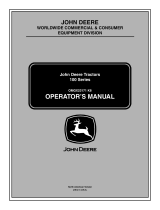 John Deere 100 Series User manual
John Deere 100 Series User manual
-
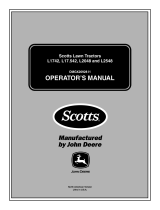 John Deere L2048 User manual
John Deere L2048 User manual
-
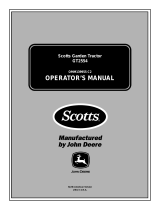 John Deere GT2554 User manual
John Deere GT2554 User manual
-
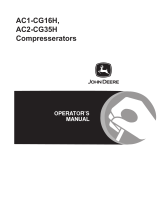 John Deere AC1-CG16H User manual
John Deere AC1-CG16H User manual
-
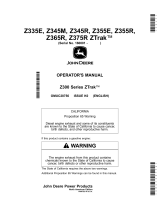 John Deere BG21253 User guide
John Deere BG21253 User guide
-
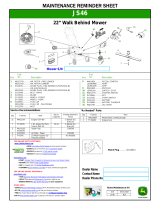 John Deere JS46 User manual
John Deere JS46 User manual
-
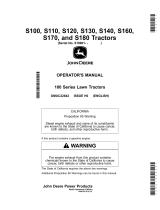 John Deere BG21223 User guide
John Deere BG21223 User guide
-
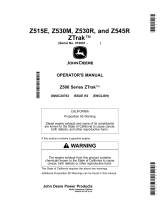 John Deere BG21197 User guide
John Deere BG21197 User guide
-
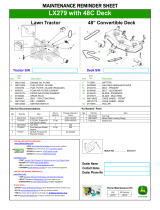 John Deere 48C User manual
John Deere 48C User manual
Other documents
-
Ryobi RY48130 Owner's manual
-
Ryobi RY48130 User manual
-
John Deere Products & Services D100 User manual
-
Troy-Bilt ULTIMA ZT3-60 User guide
-
Cub Cadet ULTIMA ZTX4-48 User guide
-
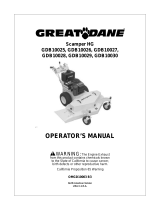 Great Dane Lawn Mower GDB10028 User manual
Great Dane Lawn Mower GDB10028 User manual
-
Cub Cadet CC30H Troubleshooting guide
-
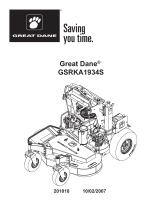 Great Dane GSRKA1934S Owner's manual
Great Dane GSRKA1934S Owner's manual
-
Bluebird CH400H User manual
-
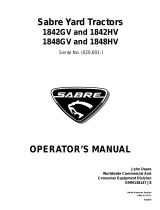 Sabre 1848HV User manual
Sabre 1848HV User manual



































































